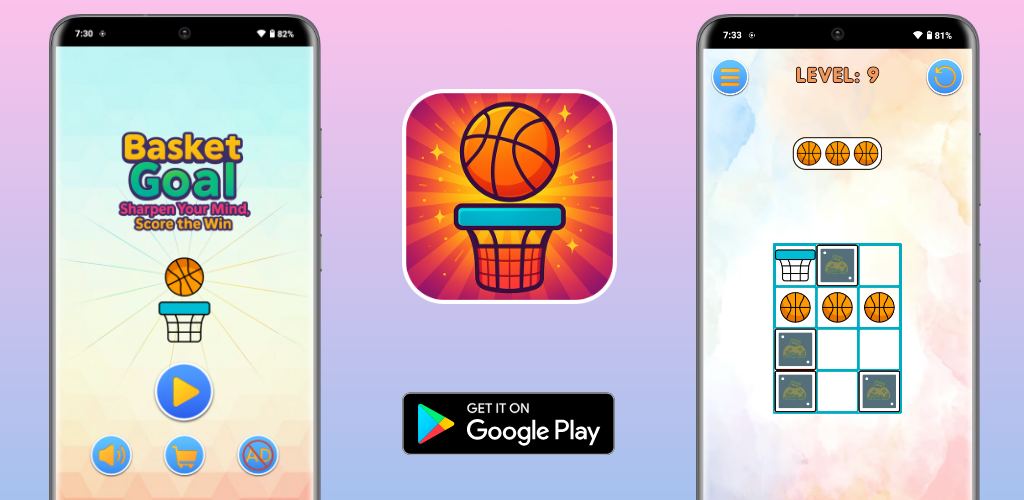The Joy of the “Swish”: How “Basket Goal Puzzle” Engineered Happiness Through Brain-Teasing Fun
In a digital landscape saturated with high-octane action and complex narratives, a quieter, more cerebral genre of gaming is capturing the hearts and minds of millions: the puzzle game. Among the plethora of options available, a charming and deceptively simple title, “Basket Goal puzzle,” has emerged as a beacon of brain-refreshing entertainment. This engaging game, where players manipulate a maze of blocks to guide a basketball into a hoop, is more than just a way to pass the time; it’s a meticulously crafted experience that taps into the very core of what makes our brains feel happy and fulfilled. This article delves into the delightful world of “Basket Goal puzzle” and explores the profound relationship between solving its intricate puzzles and the genuine happiness it cultivates.
“Basket Goal puzzle” presents a straightforward premise: on a grid filled with various blocks, your objective is to strategically move them to create a clear path for a basketball to roll into the net. With over a hundred levels of escalating difficulty, the game is designed to be accessible to players of all ages and skill levels, yet it offers a substantial challenge for even the most seasoned puzzle enthusiasts. The initial stages gently introduce the core mechanics, lulling players into a sense of comfortable problem-solving. However, as one progresses, the complexity burgeons, demanding a higher degree of logical thinking, spatial reasoning, and foresight. It’s a game that doesn’t rely on flashy graphics or adrenaline-pumping action but on the pure, unadulterated satisfaction of a well-thought-out solution.
But what is it about sliding blocks and sinking a virtual basketball that translates into a tangible sense of joy? The answer lies in the intricate dance between our cognitive processes and our emotional responses, a dance that puzzle games like “Basket Goal puzzle” choreograph with remarkable precision. One of the key players in this neurological ballet is dopamine, a neurotransmitter often hailed as the “feel-good” chemical. Our brains release dopamine in response to rewarding experiences, creating a sensation of pleasure and motivating us to repeat the behaviors that led to it.

Every time a player successfully solves a level in “Basket Goal puzzle,” they receive a small but significant surge of dopamine. The “aha!” moment when the correct block configuration clicks into place, the satisfying animation of the ball rolling smoothly into the net, and the cheerful “level complete” notification all serve as positive reinforcement. This steady stream of micro-rewards keeps players engaged and motivated. The game’s design, with its progressively challenging levels, ensures that this dopamine release doesn’t become monotonous. Each new puzzle presents a fresh challenge, and the effort required to overcome it makes the subsequent reward all the more potent. This carefully calibrated difficulty curve is crucial; if the puzzles were too easy, the sense of accomplishment would diminish, and if they were overwhelmingly difficult, frustration would replace enjoyment.
Beyond the immediate gratification of a dopamine rush, “Basket Goal puzzle” excels at inducing a state of “flow.” Coined by psychologist Mihaly Csikszentmihalyi, flow is a state of complete immersion in an activity, where one is so focused that the sense of time and self seems to melt away. This optimal experience is achieved when there is a perfect balance between the challenge of the task and the skill of the individual. “Basket Goal puzzle” provides the ideal conditions for flow. The clear objective of each level, the immediate feedback of moving the blocks, and the escalating difficulty that matches the player’s growing proficiency all contribute to this deeply engaging state.
When engrossed in solving a particularly tricky “Basket Goal puzzle” level, the outside world fades away. The mind is entirely consumed with the spatial relationships of the blocks, the potential paths of the ball, and the logical steps required to reach the goal. This intense focus is not stressful; on the contrary, it’s a form of mental rejuvenation. In this state of flow, our minds are shielded from the anxieties and distractions of everyday life. The mental energy that would otherwise be spent on worry is channeled into a productive and enjoyable task. Emerging from a session of “Basket Goal puzzle” often leaves players feeling refreshed, focused, and with a sense of accomplishment that can positively color the rest of their day.
The cognitive benefits of engaging with “Basket Goal puzzle” also play a significant role in the happiness it engenders. The game is, at its core, a workout for the brain. It sharpens problem-solving skills, enhances spatial reasoning, and improves logical thinking. With each puzzle, players are essentially training their minds to identify patterns, think critically, and approach problems from different angles. This cognitive stimulation is inherently rewarding. The feeling of becoming smarter and more capable is a powerful contributor to self-esteem and overall well-being.
Furthermore, the sense of control and agency that “Basket Goal puzzle” affords its players is a subtle yet crucial element of the happiness equation. In a world where many things feel beyond our control, the self-contained universe of the game offers a space where our actions have direct and predictable consequences. We are the masters of this small domain, and our intellect is the key to success. This feeling of mastery can be incredibly empowering and serves as a welcome antidote to the feelings of helplessness that can sometimes creep into our daily lives.
In conclusion, “Basket Goal puzzle” is a testament to the fact that happiness in gaming doesn’t always come from explosive action or epic sagas. It can be found in the quiet satisfaction of a puzzle solved, in the elegant simplicity of a well-designed mechanic, and in the gentle hum of a brain fully engaged in a rewarding challenge. Through its clever use of dopamine-inducing rewards, its ability to foster a state of flow, and its inherent cognitive benefits, “Basket Goal puzzle” offers more than just a distraction; it provides a genuine and accessible path to a happier state of mind. So, the next time you see that small icon on your screen, remember that you’re not just playing a game – you’re embarking on a delightful journey of brain-refreshing fun, one satisfying “swish” at a time.

Play Basket Goal on the Web







